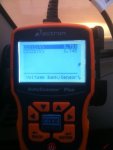I will continue with the 'urination contest' (and if you don't like it, just move on to the next post/thread. And thank you for NOT making negative comments when 2 people are just having a friendly discussion), as the ultimate winner will not be determined by any discussion here, but by the changes in legislation that WILL come. And old school engines without their emissions controlled according to environmental requirements will eventually be banned from use, including marine engines (have a look at California, already coming)... I know a lot of closed bodies of water have the use of 2 strokes banned. Non-emission controlled 4 stroke bans will come, and there will be very little anyone can do about that... (thankfully

ray

And yes, muscle cars are restored here, only we don't call them 'muscle', they are 'classics'..

The only reason they are restored back to Carb and points is so they can be licensed. If the restoration deviates from
anything original they are no longer considered 'restorations' and must meet the latest laws, including emissions, which none of them would meet, because they have, oh, carbs!
Do you know how many carb rebuilders there are left in my city? I think it's only 1, and he spends most of his time fitting ..... EFI conversions... :lol:
...Does no one restore classic muscle cars in Aust? Because of those that do here, 95% of them retain the old school systems because guess what, they are much more reliable if maintained than you might think. ...
Not disagreeing with this statement, but as you pointed out (and I bolded), 'if maintained'.... Guess what, with MPI
there is no maintenance, which means Kettering is NO BETTER if maintained, but considerably worse if neglected. That's the thing with MPI, if you ignore it, it just keeps working for you, unlike points, which 'chuck a sad'...
Now, let's move on to the thing you claim is easier with a points engine, servicing. My list of tools and 'parts' for a standard annual
engine service (this excludes the drive because essentially, they all require the same service)....
MPI engine.
Oil,
Oil filter,
Fuel filter,
Oil and fuel filter strap wrench.
Oil pan plug wrench (or, as I use, a vacuum tank to suck the oil out through the dipstick tube)
(if the job is the 5th annual service include the following)
New spark plugs,
Spark plug wrench.
Time to do the job: about 20 minutes....
Points engine
Oil,
Oil filter,
Fuel filter,
Oil and fuel filter strap wrench.
Oil pan plug wrench (or, as I use, a vacuum tank to suck the oil out through the dipstick tube)
New spark plugs,
Spark plug wrench.
New points,
New condensor,
New rotor,
Screwdriver for points screw
Feeler gauges,
Hand-held Dwell/Tach
Timing light
Remote starter switch
Screwdriver to adjust carb mixture and idle speed screws,
Knowledge of points gap, dwell, initial timing, and idle speed (usually in some form of service manual to be dragged up into the boat)
Time to do the job: about an hour.
Gee, I know which one is easier... :facepalm:
I'm already here, but only for my vehicles, as you can see....I've done the Chrysler Hemi tune up with 16 spark plugs that the dealer charges $350 for, plus all the other maintenance this complex vehicle requires. ...
Why are you paying a DEALER more than $21 each for spark plugs when you could be buying them from
Summit for a third of that? And the other thing to consider is the service interval. Most modern engines with electronic ignition (usually controlled by an ECU) have a service interval of around 50K miles. Oh, and what 'other maintenance'? From what I can see you should be buying less, not more... Oh,
you bought a Jeep, sorry... That explains it... also think on this...Given the spark plugs are (only slightly) more expensive, but the interval is 3 or more times longer, that makes the expensive plugs (and hence MPI/EFI) cheaper.... Q.E.D.....
Chris....




















